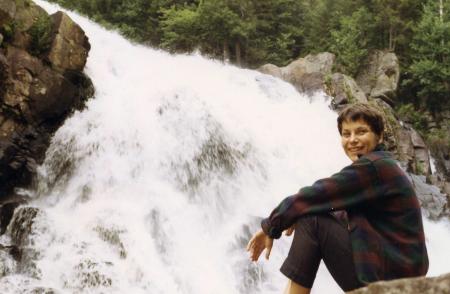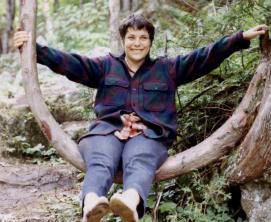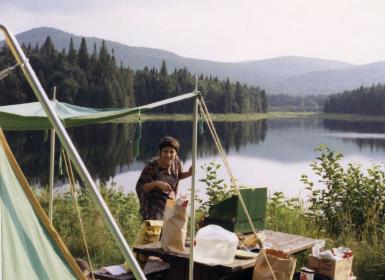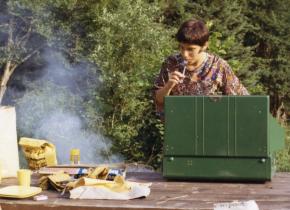
In planning the vacation, Margie was particularly attracted to Mont-Tremblant National Park Note 1, because a brochure described it as "A veritable paradise of lakes and waterfalls". Although in 1969 it was beginning to develop into a winter ski area, it was also open for camping in the summer months. Arriving at the park, we found most of the campers clustered in a fairly dense camping area near the entrance. This was not what we had in mind for a romantic interlude. In a small zoo, one cage contained a black bear. A sign in English and French said something like, "The black bear is an example of local wildlife. They seldom bother people." We bought some supplies, and pressed on into the interior of this enormous park, looking for a more private camping area.
But before we fell asleep, we heard some noises in the brush, followed by what sounded like an animal scratching on the outside of the tent canvas! What the hell was that? We recalled the exhibit at the park entrance, so we knew that the local black bears seldom bothered people. Seldom?!!! We made some noise, but whatever it was didn't stop scratching on the tent. We were about 30 meters from our car, which was up a small bluff. Cell phones? Didn't exist (this was 1969, remember, and cellular telephones weren't introduced in the US until the early eighties). I grabbed a flashlight, and started to go outside to see what it was. Margie screamed, "No!", as she pictured my being eaten by a bear! But I was not to be deterred. Whatever it was disappeared into the brush as I shone a light on it - I saw only a small flash of unidentifiable fur. Back in the tent, we slept very fitfully that night (but we rejected the notion of walking up the hill in the dark and sleeping in the car). In the morning, things looked a lot better in the sunlight. The opening in the bushes that I had seen the animal disappear into looked too small for a bear. A raccoon, perhaps, or a skunk? Skunks are unconcerned if you make noise. Nobody bothers a skunk. I pumped air into the white gas canister to pressurize it, fired up the Coleman stove, and we cooked French toast for breakfast. As we ate, there was motion in some nearby tall grass. It didn't concern us too much, as it didn't seem that whatever was moving the grass could be large enough to be dangerous, given that we couldn't even see the animal. Nevertheless, it was causing quite a stir. Suddenly, a small red squirrel leapt out of the grass, dashed across the table, grabbed a piece of French toast right off a paper plate, and ran with it back into the grass. Well, I guess if you invade a wilderness location, you've got to pay rent to the locals. But we didn't want to pass another night there. We left the park after breakfast, a day earlier than we had planned.    Note 1: The French name "Mont Tremblant" means "Trembling Mountain". The name came from the local Algonquins, who also called it the "mountain of spirits". Some searches on the web left me undecided as to whether to write "Mont-Tremblant", with the hyphen, or "Mont Tremblant", without. I can't use my usual trick of searching on both and counting up which has the larger number of hits, because search engines all seem to ignore hyphens. It's a French name, and in the end I decided that more of the "official" sites in French use the hyphen, so that's what I did on this page. As an aside, the French pronunciation of "Montréal" is interesting. Following French pronunciation rules, which are complex, but pretty regular, the "t" in the middle ought to be sounded (as in the word "contrat", for instance). But it's not. Although it's written as one word, it's pronounced as two, as if it were "Mont Réal" (the "t" then becomes a final consonant, so it's silent). "Réal" is an old French word meaning "royal". The modern French word is "royal", just like the English, but "real" (pronounced "ray-AL") still means "royal" in Spanish (it needs the accented "é" in French, but not in Spanish). [return to text]  |


